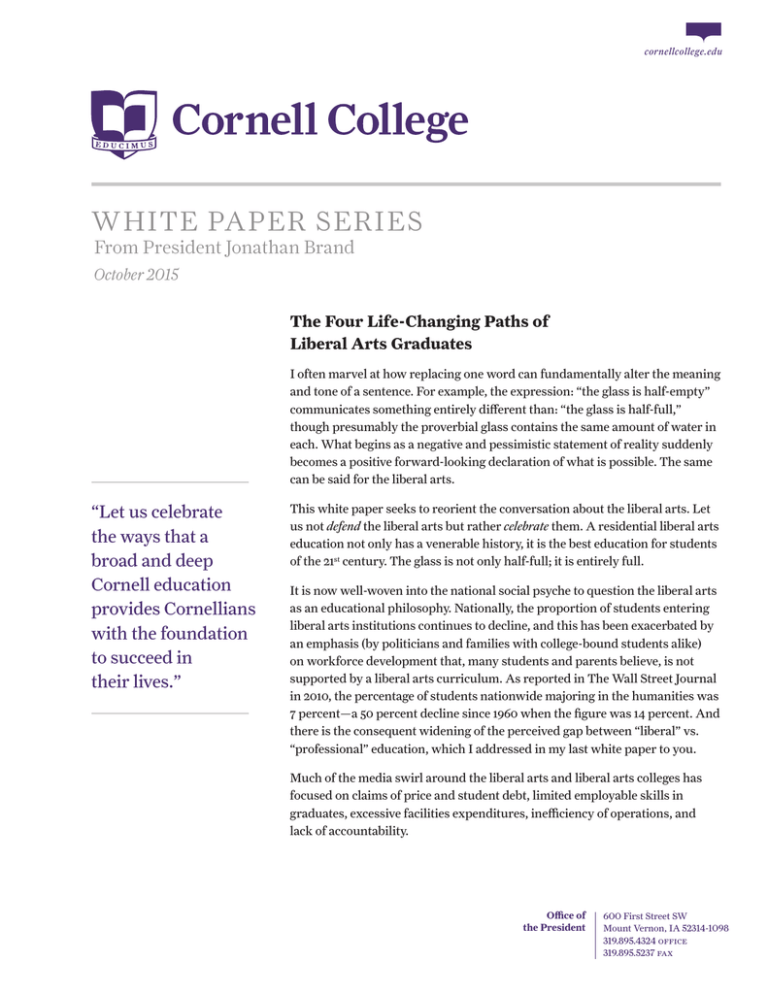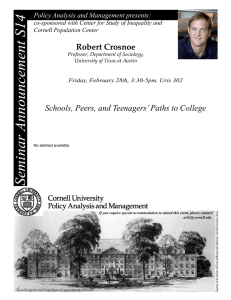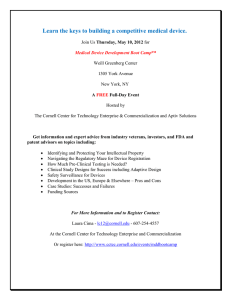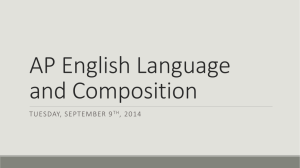WHITE PAPER SERIES From President Jonathan Brand The Four Life-Changing Paths of
advertisement

cornellcollege.edu WHITE PAPER SERIES From President Jonathan Brand October 2015 The Four Life-Changing Paths of Liberal Arts Graduates I often marvel at how replacing one word can fundamentally alter the meaning and tone of a sentence. For example, the expression: “the glass is half-empty” communicates something entirely different than: “the glass is half-full,” though presumably the proverbial glass contains the same amount of water in each. What begins as a negative and pessimistic statement of reality suddenly becomes a positive forward-looking declaration of what is possible. The same can be said for the liberal arts. “Let us celebrate the ways that a broad and deep Cornell education provides Cornellians with the foundation to succeed in their lives.” This white paper seeks to reorient the conversation about the liberal arts. Let us not defend the liberal arts but rather celebrate them. A residential liberal arts education not only has a venerable history, it is the best education for students of the 21st century. The glass is not only half-full; it is entirely full. It is now well-woven into the national social psyche to question the liberal arts as an educational philosophy. Nationally, the proportion of students entering liberal arts institutions continues to decline, and this has been exacerbated by an emphasis (by politicians and families with college-bound students alike) on workforce development that, many students and parents believe, is not supported by a liberal arts curriculum. As reported in The Wall Street Journal in 2010, the percentage of students nationwide majoring in the humanities was 7 percent—a 50 percent decline since 1960 when the figure was 14 percent. And there is the consequent widening of the perceived gap between “liberal” vs. “professional” education, which I addressed in my last white paper to you. Much of the media swirl around the liberal arts and liberal arts colleges has focused on claims of price and student debt, limited employable skills in graduates, excessive facilities expenditures, inefficiency of operations, and lack of accountability. Office of the President 600 First Street SW Mount Vernon, IA 52314-1098 319.895.4324 office 319.895.5237 fax These criticisms have put schools on the defensive—reactively. But, the best defense is a great offense; it’s proactive and forward-looking. We need to focus on what we offer that is both life-changing and distinctive. Students and graduates regularly tell us that Cornell College changed their lives. Or, as I like to say, Cornell College gave them the tools so that they could change their own lives. Let us celebrate the ways that a broad and deep Cornell education provides Cornellians with the foundation to succeed in their lives. It is a challenge to define in any hard and fast way one type of successful liberal arts graduate because there is an infinite number of ways to define or understand success. And, that success is personal. Below is a general taxonomy—in which each of four categories contains the story of a Cornellian’s journey in his or her own words. As with many organizing principles, the lines blur between these categories, and over time, people also move from one to another. All of the stories are compelling. The path of crystal clarity: The individuals who always knew what they wanted to do when they “grew up.” These individuals each gained a broad education with depth in at least one area (the major) and are now working in a field directly related to it. A. Felecia Turner Epps ’80 My first memory of wanting to be a lawyer was in 7th grade. I told my mother, and she immediately began to tell others that I was going to be a lawyer. That’s my mother (Lillie Turner)—always the encourager and the nonstop cheerleader in my life. In high school I found that I loved reading and writing. I read books about trials. Lizzie Borden, Sam Sheppard, Ethel and Julius Rosenberg, and others. I thought that representing people in criminal trials was something that I wanted to do. The stories surrounding these cases were fascinating to me. I had no idea where I wanted to attend college. My guidance counselor at Bloom Township High School in Chicago Heights set up interviews for me with representatives from small Midwestern liberal arts schools. Perhaps she chose liberal arts colleges because of my love for reading and writing, and because she knew I would do better in a small college rather than in a big university with thousands of students. My family visited Cornell, and I knew it was the place for me. Cornell College fit me. It offered a liberal arts education—perfect for someone planning to go to law school. Trial lawyers talk a lot, but all lawyers must be strong communicators. Reading, writing, and critical thinking skills are the key. I gained training in these skills at Cornell as well as exposure to a variety of disciplines. To earn my B.A. degree, I had to struggle through precalculus, astronomy, and biology, as well as the courses I loved: sociology and politics. My favorite courses were Constitutional Law and the Sociology of Education. I also loved an English class on Shakespeare. The professor read from plays as he walked on top of the table. I think he must have wanted to be an actor! I spent a semester at American University in Washington, D.C., where I worked for the public defender at St. Elizabeth’s Mental Hospital. This was an eye-opening experience because it was the first time I had been that far away from home, and also the first time I had been in a real courtroom. The lawyers assigned student interns to go to the wards and interview new clients. Great semester! During the fall of my junior year, a recruiter from the U.S. Marine Corps came to campus and ultimately I signed up and spent the summer between my junior and senior year in Quantico, Virginia, at Officer 2 Candidate School. All Marines are basic warriors, so I had to be trained as a warrior before becoming a judge advocate. The JAG program promised immediate experience in court. That’s what I wanted to do, so it was attractive to me. To get into the JAG program, I had to complete officer training as well as get into law school. I attended Creighton University Law School, in part because it offered a full scholarship. I graduated in 1983, served 10 years as a Judge Advocate, followed by six years as managing attorney of the Georgia Legal Services Program in Albany, Georgia. I have been at the University of Arkansas at Little Rock Bowen School of Law for the last 16 years teaching and serving as an administrator. Who knows what the future holds! Cornell College gave me a great foundation in writing and critical thinking. The courses required that I read challenging material, synthesize information, and write. These are the most important skills of a lawyer. Thinking, reading, and writing are the basis for everything a lawyer does in court. Oral advocacy comes easily, at least for me. The path of evolving crystal clarity: The individuals who came to college intent on majoring in something and excelling in it professionally, but then switched to a major and career they never considered (e.g., the student who enters college as a “science-phobe” and ends up a scientist). Frank Leupold ’68 I arrived on campus in the autumn of 1964 determined to begin work on a biology major, with a special microsurgery project removing the chloroplasts from euglena, on my way to an M.D. and Ph.D. in medicine and a career in neurosurgery. I settled into the honor dorm and discovered my roommate had been invited to the theatre reception for entering students who had participated in theatre in high school. I had participated in theatre my senior year, so I was quite nonplussed that I had not been invited. After learning it was open to anyone, I attended. At the reception, already-cast members performed a scene from Aristophanes’ “Lysistrata,” the fall play. I had seen the Lunts do a scene from this play on television and knew it to be rather scandalous. Despite being a perfect Sunday school attendee, I was somewhat a rebellious person, and had to be part of this stirring play. So, I tried out, and achieved not only a role in the chorus, but was cast as one of the leads in a play for children, and then as the Duke in “The Merchant of Venice.” Due to my course load I told the speech and theatre chair that I only desired to be in “Lysistrata.” The Purple Masquers were so thrilled to have a science major that they asked me to join, and I became an officer. My sophomore year, Cornell graciously sent the Cornell Players’ officers to the Yale Festival of Undergraduate Drama. Raised with Iowa community spirit, I felt an obligation to pay Cornell back, so being urged to direct a play (WHAT? A barely knowledgeable non-theatre major!) and thinking that it would be easier, I decided to direct the children’s show the next year. Little did I know that the reduced attention span of youngsters makes this genre one of the most difficult in which to succeed. Back on the biology front, extra hours in the lab and an abiding interest in discovery only allowed me to achieve a B+ in comparative anatomy. In my mind, admission to Harvard Med, or perhaps any med school, disappeared. 3 I added a speech and theatre major to my curriculum. The first question from my junior orals committee (biology advisor, theatre advisor, chemistry professor) was, “Why are you double-majoring in biology and theatre?” My response, spur of the moment, not consciously considered, was, “I’m not. I’ve decided to major in theatre.” (Remember the rebellious spirit, and it did disarm the committee.) Their response, “Why?” Through discussion, I eventually arrived at the statement that, though the sciences were creative in their own right, the object of scientific investigation is to arrive at the same results every time to prove a hypothesis; while in theatre, because of the mutable nature of an audience, it is to evolve results which are always different. I passed, but within the year dropped my biology major. Then in a decision that to me now seems fantastical, I was allowed to direct O’Neill’s “Long Day’s Journey Into Night” for my senior thesis project. And it wasn’t bad, in fact it was selected for encore performances. And perhaps in the most surprising moment of my Cornell career, I was asked to move up the line, as I had graduated with “distinction in my major field.” After a dance with the military draft, I enrolled in a master/apprentice program at the University of Texas’ M.F.A. theatre program. I went on to teach at the College of the Holy Cross and migrated to the National Center for African American Artists; then independent design and directing, and directing Elder Arts in Boston. Moving to Los Angeles, I had the great fortune to work with and eventually direct Louis Fantasia, an internationally preeminent director, specializing in Shakespeare. I also expanded my career into film and television after completing a certificate program at the UCLA Extension. A reconnection with Calvin Bowers nudged me into producing and mentoring him, and then the LEL Brothas, a hip hop group that I accompanied to the Kingdom of Saudi Arabia during the Arab Spring, and twice more, to collect footage for an anticipated documentary of this independent American group. From Socratic circles, to hay bale Parisian discussions, to TED talks, the challenge of presenting cogent argument within fluid boundaries highlights an elevated atmosphere for learning. Cornell afforded me the opportunity to experience more than the narrow view of career-focused education, and to sample a plethora of courses, experiencing their rigors and joys and various definitions of achievement. Cornell Theatre gave me the basis to nurture my burgeoning desires and go on to supplement them and achieve a career in the entertainment arts. That Cornell Theatre made bold choices in its producing program, with necessarily innovative designs due to limited budgets, gave me the facility to work with budgets from near zero to nearly unlimited. That I was allowed to direct such a major work from the theatre canon, at such a young age, definitely gave me the confidence that anything was possible. The tortuous path of continuous self-defined happiness: The individuals who never knew what they wanted to do and continue to find success and happiness post-graduation by creating opportunities on an ongoing basis. Success and happiness in this case are self-defined. This category enlivens Maya Angelou’s statement that: “You find your path by walking it.” I believe that this group will grow over time as this generation of students finds many more new, yet-to-be-defined, opportunities in the future. Dustin Waite ’06 My Cornell transformation could be best described by looking at my proposed majors, philosophy and religion, and what my degree said when I walked across the stage, geology and environmental studies. Pretty much polar opposites! 4 The first course that gave me purpose was GEO 105 Marine Science, instructed by my future adviser and friend, Ben Greenstein. The topics and conversations I experienced in this class made sense to me, and were compounded when Ben approached me after the class and asked if I’d be interested in going to Australia with him to study coral reef systems. Um ... yes!!! This would be the first of a handful of studyabroad courses that played the biggest role in shaping my transformation as a human being. I traveled to Australia, New Zealand, and the Bahamas to study various topics of geology and marine sciences, where I saw the results of massive tectonic plate shifts and observed the famous K-T boundary, an interval preserved in the rock record that indicates a meteorite struck and killed all the dinosaurs. In all of these places, a major opportunity for personal growth was meeting the locals and getting to talk with them. I also traveled to Italy for my Roman Archaeology course, which allowed me to run a lap around the Circus Maximus—where the ancient chariots once raced—and walk to the top of Mount Vesuvius to look into the crater of one of the most famous volcanic eruptions. When my time at Cornell ended, I took a position as a staff geologist for Geosyntec Consultants in Santa Barbara, California. Here I got the opportunity to clean up contaminated sites where our clients hoped to develop housing, schools, and the first public park in the city limits of Los Angeles in over 100 years. Next I pursued a career in teaching. One of my last courses at Cornell had been Educational Psychology. This course, along with my four years’ involvement in Cornell’s Lunch Buddy and Elementary Reading programs, helped me realize a passion for working with children. I found myself in Denver as a certified environmental educator responsible for leading groups of children on educational excursions at different city parks. When funding ended for my position, I moved to Hawaii to work with the Lahaina Restoration Foundation, a historical society that preserves buildings and artifacts, where I helped to curate the Lahaina Heritage Museum. After finishing my projects in Maui, I pursued my life goal of hiking the Appalachian Trail. Once again, my best memories were those of spending time with friends and people of all backgrounds that I met along the way. My hike was cut short when I experienced heart complications due to Lyme disease, and I headed back to Iowa to be closer to family for the first time in eight years. I started working as a server for the new, award-winning, Lion Bridge Brewing Company, and it was surprisingly satisfying. My ability to communicate with different types of people was my biggest asset. The owners began to see these traits and offered me the opportunity to work as their wholesale distributor to other bars. I am now the head of sales and delivery for an award-winning brewery in my hometown. I may tap kegs in bars, but I also understand how complex draft systems operate, which involves an understating of cooler temperatures, dissolved gases, and friction of materials used. Working as a salesman is actually quite fun for me. The key to my ability to keep redefining myself has been the diversity of my coursework at Cornell and the diversity of people I worked with—whether in athletics, work study, or class—and the feeling that I was always able to ask questions of others. I never felt like I was a geology major at Cornell, but that I was a Cornellian who majored in geology. I was in plays, a social group, sports, attended after-hours art classes, and tailgated choir concerts (yes, that happened). This all helped me develop as a person who can see there are many opportunities in this world in which one can make a stimulating life. Keeping a positive attitude will ensure the right scenario will present itself, and I have no doubts that I will be able to learn whatever skills are needed to be successful—success being a subjective term that only matters how I define it. 5 The path of prepared uncertainty: The individuals who have excelled in a field that is arguably unrelated to their major. Christine Larsen ’83 I grew up in a rural community in western Iowa, deeply involved in the family printing business. My parents are the practical sort, and they both strongly emphasized preparation for employment. My mom “made” me take typing and bookkeeping along with college prep curriculum (she anticipated the Internet?); my father’s dream was that I become an Iowa state engineer. And while my high school grades and test scores were excellent, I spent my largest energies in high school playing basketball. I fell in love with Cornell College, as so many of us did, on the first drive down College Avenue. I have now traveled to many extraordinary places in the world, but few are as beautiful as the Cornell campus on a perfect fall morning. And the women’s basketball team was coming off a horrendous season, so I was confident I could play. My first academic year was challenging. I was “pre-med” (nobody can argue with that) and took intro biology and chemistry courses in my first semester. Second semester, I discovered the humanities, learning how to write for Rich Martin while reading Shakespeare for the first time. And that spring, the magic happened—I experienced “A Midsummer Night’s Dream” in King Chapel, the Lacey production, with Dan Wilch as Bottom. I went to chapels and lectures, and launched into Classical Greek with Dr. Crossett and half a dozen new-to-me Cornellians. We read Aristotle, spending hours discussing a single word. I was being taught how to read carefully, think critically, and write tightly. In my junior year, I took the three block series of organic chemistry with Dr. Ault. I thrived on the concepts, the hard work, and the great satisfaction of being able to reason the outcome of a reaction. But the third block, then 18 continuous class days in the lab, taught me essential lessons about myself: first, that I do not like messes, and therefore being a physician was out of the question, and second, that the solitary lot of the lab scientist was not for me. I love language and I love to talk! I declared English as my major and threw myself into modern novels and poetry. And I had an intuition, a sense, that the new “personal computers” just emerging could completely change the way many people did their work, and that the key to that would be in the language understood between computer and human. This thought led me to the study of “information retrieval” which I studied at the iSchool at Syracuse University, earning a master’s degree in library science while studying database structure and “natural language processing.” This degree led me to a career in technology and operations, where I have used technology in the broadest sense to solve client experience problems in financial services. As chief operations officer for First Data, I constantly anticipate the outcome of complex interactions between technology and regulation and human behavior, a kind of wild melting pot between organic chemistry and Russian novels. I see the world in patterns, seeking to recognize the core issue underlying today’s problem—in order to be able to use a tried solution to what seems to be a new problem. My years at Cornell College allowed me to cover an enormous amount of academic and personal ground in a remarkably condensed and delightful way. The teachers and my fellow students generously shared their 6 passions, and I learned both what I liked, and more importantly, what was simply NOT ME. My capacity to read closely and learn deeply, to pursue answers to difficult problems, and to work with diverse groups of people serves me every day of my life. In 1980, no one could have anticipated I would earn my living providing web-enabled commerce solutions, and yet my Cornell education was the perfect preparation. *** To be sure, this white paper has not touched on the entrepreneur per se: The individual with a spirit to create new opportunities, businesses, or industries. This is a complicated topic because the entrepreneur actually fits into several of the foregoing categories; ultimately, a liberal arts education gave them the foundation to grow out of any of these paths. Given its exciting complexity, I will save the topic of the entrepreneur for a future white paper. These Cornellians’ stories reveal in honest and personal ways precisely why the 21st century needs the liberal arts, and why we should be celebrating what Cornell College helps our students accomplish as liberally educated citizens. While at Cornell, our graduates develop a broad foundation of knowledge and also hone vital skills related to inquiry, critical thinking, and ethical decision making. They learn to try, and they learn to persist. They learn to work together. And, as thriving liberal arts graduates, they excel in one or more paths—whether they know that path or not. Jonathan Brand President This presidential white paper is part of a series on matters of importance to Cornellians. I welcome any comments or observations you might have on this white paper topic. You can always reach me at 319-895-4324 or jbrand@cornellcollege.edu. 7


